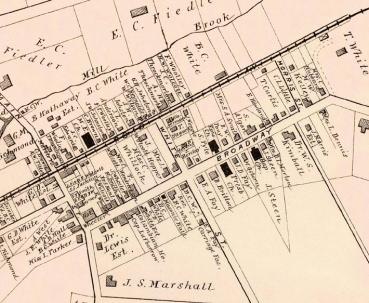New Jersey Future Blog
Trash and Landfills-A Smart Land Use?
October 16th, 2007 by Tim Evans
- New Jersey is currently home to more than 800 active and closed landfills. Together, these landfills cover more than 10,500 acres—an area twice the size of the city of Trenton, and equal to eight months’ worth of new land development for the entire state (using the development rate of approximately 15,000 acres a year between 1995 and 2002).
- New Jersey’s solid waste generation has steadily increased from 11.4 million tons in 1985 to 21.5 million tons in 2005. To put that number
- On a per-capita basis, New Jerseyans produce about 5.4 pounds of trash per day—more than twice the daily output of most industrialized countries.
- More than 40 percent of the state’s trash disposal (excluding recycling) gets exported out of state.
- Using conservative estimates, if New Jersey’s solid waste generation, recycling and waste-export rates stayed at 2003 levels, storing our trash would require nearly 6,000 additional acres of landfills by 2050. And add another 5,000 acres if other states won’t accept any of our trash.
Measuring the Cost
Landfills require a lot of space—every 40,000 tons of municipal solid waste added to a landfill condemns at least one acre of land—and new sites are difficult to find. As a state with scarce open space for landfill facilities and a large waste-generating population, New Jersey has long struggled to dispose of its solid waste. Landfills are a vital yet often overlooked land use that poses major economic challenges, forcing the state to expend significant resources and energy to ensure safe and adequate disposal.
How costly is the legacy of landfills? The capital costs to close the hundreds of New Jersey’s landfills that have not yet been properly closed are estimated to exceed $2 billion. And while landfills can be turned into job-generating and taxpaying uses, such as shopping malls, golf courses and even residential complexes, their remediation, proper closure and the long-term monitoring of environmental impacts pose significant economic and political challenges. The current controversies over the redevelopment of the 785-acre landfill in the Meadowlands and the capping of the former municipal landfill at the Stafford Business Park site illustrate that it may be more cost-effective to reduce our need for landfills than to close and reuse them later on.
Trash also poses significant costs to the environment, no matter how it is disposed of. While burning it in one of the state’s five incinerators produces energy, it also increases air pollution and greenhouse gas emissions. Transporting it out of state (New Jersey is one of the nation’s leading trash exporters, primarily to Pennsylvania) shifts the problem to our neighbors, adds to air pollution, and poses safety issues. Alternately, dumping trash in one of the state’s 12 active commercial landfills (49 percent of the state’s trash gets landfilled) poses a series of adverse long-term impacts on water and air quality. For instance, biodegradation can emit hazardous gases for centuries, among them methane—a greenhouse gas 21 times more potent than carbon dioxide.
Taking the Pressure Off the Land with Recycling
There are many solutions to the towering trash challenge that are both economically attractive and environmentally desirable. Recycling (New Jersey is the only state that mandates it) has played a role in decreasing the amount of trash New Jersey generates, although the recycling rate—currently at about 36 percent of the state’s municipal solid waste—has been dropping since the mid-1990s. Every item that’s recycled rather than discarded reduces the burden of solid waste, saves limited landfill space, preserves finite natural resources, and decreases water and air pollution. In addition, reusing materials saves energy that directly translates into reduced greenhouse gas emissions. In many instances, recycling also makes good financial sense, as towns can make money by selling recycled materials instead of paying for disposal.
Beyond mandatory curbside recycling of bottles, cans, and paper products, there are other, more incentive-based steps governments can take to promote recycling and reuse. “Pay-as-you-throw” or “variable rate trash disposal” programs have been shown to significantly increase recycling rates and reduce waste disposal while decreasing overall waste management costs. Similar to the way utilities charge for electricity, gas, and water, these programs base solid waste pickup charges either on volume or weight of trash, and thus more closely reflect the actual costs of disposal.
While recycling is an important step toward a more sustainable lifestyle, public education can help us to “pre-cycle”—to reduce trash in the first place, e.g. through less unnecessary packaging and fewer disposable items, such as one-way beverage containers, paper plates, diapers, and plastic bags.
Trash disposal is an unpopular land use, but the lifeline of our communities depends on it. The Garden State has to decide if trash will continue to eat up large chunks of our valuable remaining open spaces, and what kind of legacy we want to leave for future generations. In light of the great fiscal and environmental costs associated with landfills, New Jerseyans can—and should—do much more to reduce their garbage pile.
If you have any questions about this issue of Future Facts Tim Evans, Research Director.
Sources:
Brown, Lester R., “New York: Garbage Capital of the World,” Earth Policy Institute, 2002.
Columbia University, Earth Engineering Center and BioCycle magazine, “The State of Garbage, 15th Nationwide Survey of Municipal Solid Waste Management in the United States,” 2006.
Columbia University’s Earth Institute, “Life After Fresh Kills: Moving Beyond New York City’s Current Waste Management Plan,” Earth Engineering Center and Urban Habitat Project, 2001.
EPA on Recycling and Waste Management.
Goodman, David L., “The Economics of Trash, Creating an Economic Solution to Solve the Problem,” 2005 National Recycling Coalition.
New Jersey’s State Wide Solid Waste Management Plan
Northeast Waste Management Officials’ Association.
















